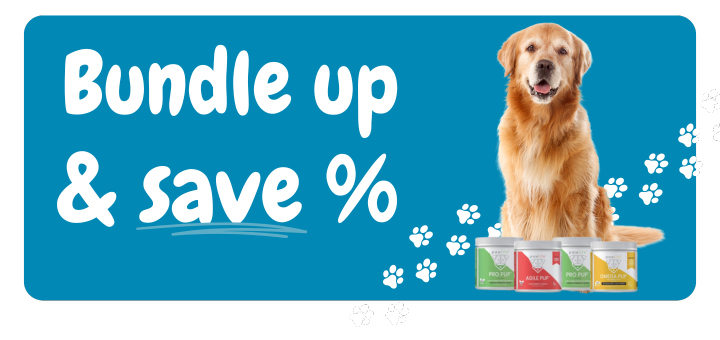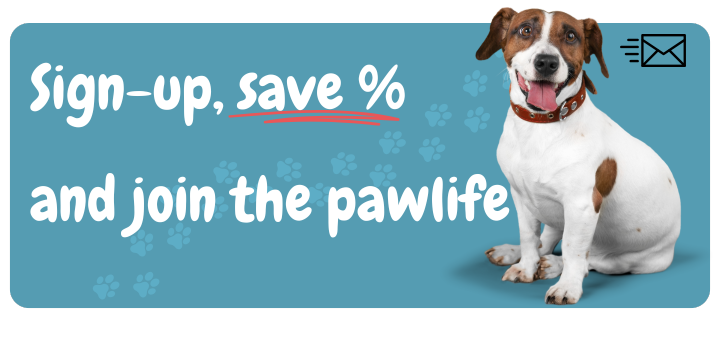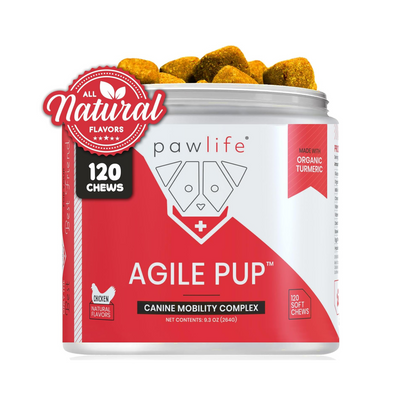7 Natural Calming Tips for Stress Relief in Anxious Dogs
Just like people, dogs can experience nervousness and anxiety — and every dog’s triggers are different. Some may become stressed by thunderstorms or fireworks, others by being left alone, traveling, or meeting new faces. Understanding your dog’s anxiety is the first step to helping them find peace. At Pawlife, we believe that compassion, consistency, and the right natural support can make all the difference in your pup’s comfort and confidence.
Key insight: Calming anxiety starts with identifying what triggers your dog’s stress and addressing it patiently. The goal isn’t just to manage symptoms — it’s to build trust, comfort, and resilience over time.
Anxiety can manifest in different ways: trembling, pacing, whining, destructive chewing, hiding, or even digestive upset. Once you recognize these patterns, you can begin using a mix of behavior training, physical care, and calming supplements to ease their stress. Always consult your veterinarian if your dog’s anxiety is severe or worsening.
1. Exercise Daily to Release Built-Up Energy
Exercise isn’t just about physical fitness — it’s one of the most effective natural remedies for anxiety. Dogs who don’t get enough movement often have excess energy that transforms into nervous behavior. A consistent exercise routine provides an outlet for stress, boosts serotonin levels, and helps stabilize mood.
Take your dog for a brisk morning walk, a game of fetch in the yard, or an evening jog to wind down the day. For high-energy breeds, mentally stimulating play — like agility drills or puzzle toys — can reduce boredom and anxiety. After exercise, dogs experience an endorphin rush similar to humans, leaving them calm, content, and ready to rest.
For more guidance on incorporating physical activity into your dog’s routine, check out our article Daily Supplement Routines for Dogs: How to Keep Your Pup Healthy at Every Age. It explains how pairing activity with proper nutrition enhances mood regulation and energy balance.
2. Use Calming Treats and Natural Supplements
When used alongside behavioral support, natural calming supplements can help anxious dogs relax without sedation. Pawlife’s Calm Pup Soft Chews are made with proven natural ingredients like chamomile, valerian root, L-tryptophan, and passionflower — each selected for its ability to reduce stress and promote a sense of calm. The formula also includes hemp oil, which supports relaxation through natural endocannabinoid regulation.
Unlike harsh medications, Calm Pup chews don’t make dogs drowsy. Instead, they help “take the edge off” so your pup can face stressful situations — from thunderstorms to car rides — with more composure. For dogs with chronic anxiety or combined joint tension, try the Comfort Move Duo, which blends calming botanicals with joint support for holistic relief.
Many dog parents report that their pups become more relaxed and sociable after a few days of consistent supplementation. For an inside look at the benefits of pairing calming aids with digestive support, explore our blog Calm & Comfortable: Natural Support for Dogs with Anxiety, Joint Stress & Everyday Wellness.
Integrating Calming Chews Into a Routine
Consistency is key. Give calming supplements daily — not just during stressful events — to maintain balanced serotonin and cortisol levels. Administer chews at the same time each day, ideally with meals for better absorption. Over time, your dog’s body will adapt to a calmer baseline, making it easier to handle anxiety triggers naturally.
3. Provide Physical Contact and Comfort
Never underestimate the power of your presence. Many anxious dogs find reassurance in close contact with their favorite human. Gentle petting, a calm voice, or simply sitting beside your dog during stressful moments can reduce their fear response dramatically. This form of “grounding” helps your pup associate safety with your scent and tone.
Physical comfort is particularly helpful during short-term stress like thunderstorms or vet visits. Try placing a soft blanket or calming wrap around your dog — similar to swaddling a baby — to help them feel secure. You can also use scent cues like an unwashed t-shirt in their bed to remind them you’re nearby when you have to step away.
For more strategies on strengthening this bond through consistent care, read Five Benefits of Pumpkin and Cinnamon for Dogs, which explains how diet and comfort foods influence a dog’s emotional balance.
4. Channel Nervous Energy Through Toys or Chewing
Dogs often express anxiety through destructive behaviors — chewing shoes, barking excessively, or pacing. Redirecting that energy into positive activities helps reduce stress and prevents damage. Offer durable chew toys, puzzle feeders, or bones that occupy their mind and mouth simultaneously.
Interactive toys, such as treat-dispensing balls or snuffle mats, can keep your dog focused on problem-solving rather than worrying. Chewing also releases serotonin and endorphins, which naturally soothe the nervous system. For dogs prone to separation anxiety, consider leaving a safe toy that smells like you — it can bridge the gap while you’re away.
Pairing mental stimulation with digestive support can further balance your dog’s mood. Check out Digestive Wellness for Dogs: Why Gut Health Starts with the Right Supplements to understand how a healthy gut contributes to emotional regulation and calm behavior.
5. Create a Safe, Quiet Space
Every dog benefits from a designated safe space — a place where they can retreat when overstimulated. This could be a crate, a corner of the living room, or even your bedroom. The goal is to create an environment that feels secure, predictable, and free from overwhelming noises or visitors.
Make the area comfortable with soft bedding, dim lighting, and maybe a white noise machine to mask outdoor sounds. Avoid forcing your dog into this space; let them learn that it’s their “den” by offering treats and calm praise whenever they go there voluntarily. Over time, it becomes a sanctuary for self-soothing rather than a punishment zone.
For anxious dogs with digestive symptoms during stress (like diarrhea or loss of appetite), you can support gut health with Pro Pup Pumpkin Flavor Chews or Turf Treats. A calmer gut can mean a calmer mind — a principle explained further in What Are Turf Treats?.
6. Explore Gentle Aromatherapy and Environment Cues
Aromatherapy can complement other calming techniques. Lavender, chamomile, and frankincense essential oils are known for their relaxing effects. When used responsibly, they can reduce heart rate, ease tension, and promote a tranquil environment for your dog.
If you use a diffuser, make sure it’s placed in a well-ventilated room and never directly near your dog’s nose. Stick with pure, pet-safe oils — free from artificial additives. You can also lightly mist their bedding with a diluted lavender spray or use an essential oil plug-in designed for pets.
Music therapy is another overlooked tool. Studies show that soft instrumental music, reggae, or classical tunes can lower canine stress levels. Experiment with playlists to discover which sounds calm your pup the most. Combined with Pawlife’s natural chews, these environmental cues can create a balanced, serene atmosphere that helps your dog feel safe.
7. Lead By Example — Your Calm Sets the Tone
Dogs are deeply intuitive and mirror the emotional state of their humans. If you project calm confidence, they are more likely to relax. Conversely, showing frustration, yelling, or panicking can amplify their anxiety. The best thing you can do is stay composed, speak softly, and reward calm behavior.
Training sessions during low-stress times can also build trust. Reward calm behavior with gentle praise or a Calm Pup Chew as positive reinforcement. Over time, your dog will associate relaxation with rewards rather than fear. For dogs who need extra help maintaining emotional balance during training or travel, try pairing this approach with the Calm Comfort Duo, which supports both stress control and digestive stability.
Most importantly, remember that progress takes time. Anxiety is not a behavior to “fix,” but a condition to manage with empathy, routine, and the right tools. Consistency and kindness go further than quick fixes ever could.
Additional Tips for Managing Canine Anxiety
- Stay predictable: Dogs thrive on routine. Feeding, walking, and bedtime schedules give them a sense of control and stability.
- Desensitize gradually: For noise or travel anxiety, slowly expose your dog to the trigger in short, positive bursts — always ending on a calm note.
- Combine nutrition with care: A diet rich in omega-3s, antioxidants, and probiotics supports brain and gut balance. Learn more in How Omega-3 and Wild Alaskan Salmon Oil Support Your Dog’s Skin, Coat & Allergy Relief.
- Consult your vet: Severe or persistent anxiety may require professional guidance or prescription support. Always discuss any new supplement plan with your veterinarian.
Final Thoughts: Calm Starts with Care
Helping your anxious dog isn’t about perfection — it’s about patience. The combination of regular exercise, calming supplements, comforting touch, and a stable environment can transform even the most nervous pup over time. At Pawlife, we’ve seen thousands of pet parents build stronger bonds and calmer homes using natural, vet-approved products as part of their daily care.
Whether your dog struggles with separation anxiety, noise sensitivity, or situational stress, the key is consistency. The right daily support — from Calm Pup Soft Chews to Comfort Move Duo — helps your dog feel balanced, secure, and understood.
To keep learning about holistic care and emotional wellness, explore these related Pawlife articles:
- Dog Anxiety 101: Recognizing and Easing Your Pup’s Stress
- Calm & Comfortable: Dual Support for Anxiety and Joint Health
- Daily Supplement Routines for Dogs
- Five Benefits of Pumpkin and Cinnamon for Dogs
- What Are Turf Treats?
👉 Explore Pawlife Supplements and start helping your dog live a calmer, happier life — one soft chew at a time.













